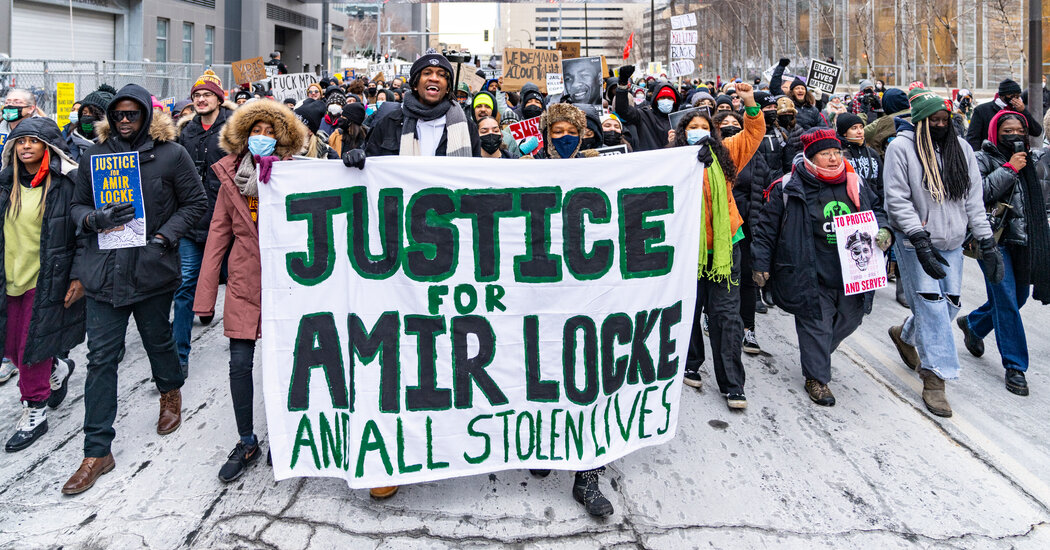No Charges Against Police in Amir Locke Shooting
The shooting drew thousands of protesters to the streets and renewed calls for police accountability in the city where George Floyd was murdered.The Minneapolis police officer who shot and killed Amir Locke, a Black man, during an early morning raid in February at an apartment complex will not face criminal charges, prosecutors announced Wednesday.The shooting drew thousands of protesters to the streets and renewed calls for police accountability in the city where George Floyd was murdered.Even as the killing provoked new rounds of condemnation against the Minneapolis Police Department and the mayor who oversees it, criminal charges were seen by legal experts as unlikely. That is because Mr. Locke, who was awakened in the early morning hours by officers entering the apartment under a no-knock warrant, was holding his own handgun. Mr. Locke owned the gun legally.Mr. Locke was 22 when he was killed. He was an aspiring musician. His father, Andre Locke, said in an emotional news conference after the shooting that his son had been days away from moving to Texas to live near his mother.“Amir Locke’s life mattered,” Attorney General Keith Ellison of Minnesota and Michael Freeman, the Hennepin County Attorney, said in a joint statement. “He was a young man with plans to move to Dallas, where he would be closer to his mom and — he hoped — build a career as a hip-hop artist, following in the musical steps of his father.”In announcing they would not file charges, the prosecutors were critical of the raid that the police carried out with a no-knock warrant, but said they would not be able to prove beyond a reasonable doubt that the officer had committed a crime in violation of Minnesota law that allows officers to use deadly force in certain situations.In a graphic, and short, video clip from a police body-worn camera that was released in the aftermath of the killing, Mr. Locke is seen under a blanket on the couch where he was sleeping, clearly groggy and startled as he raises a gun that he held in his hand.Mr. Locke was not a suspect on the warrant, which was being carried out in connection with a homicide investigation in nearby Saint Paul. But after the killing, the police department’s first statement on the incident described Mr. Locke as a suspect — a misstatement that fueled anger in the community and drew comparisons to the department’s first, misleading, statement about Mr. Floyd, which said he died after a medical emergency.In a region still shaken by the murder of Mr. Floyd, as well as the police killing of Daunte Wright, a Black man, in the Minneapolis suburb of Brooklyn Center last year, the killing of Mr. Locke reopened wounds in the community that were still raw.Mr. Locke’s killing also brought renewed scrutiny to a department that is still depleted from the exodus of hundreds of officers in the aftermath of Mr. Floyd’s murder, and one that is still struggling to enact reforms and rebuild trust with the community.That Mr. Locke was killed as police used a no-knock warrant, a law enforcement tactic that was heavily criticized in the wake of the police killing of Breonna Taylor in Louisville, Ky., in 2020 after a botched raid, only added to the anger in Minneapolis.Mayor Jacob Frey had already limited the use of no-knock warrants, but the killing of Mr. Locke drew accusations that Mr. Frey had misled the public during his campaign for re-election last year when he claimed to have banned such warrants. In response to Mr. Locke’s killing, the mayor issued a new policy this week, which prohibits no-knock warrants and requires officers to knock and announce their presence, and then wait, before entering a building.“This policy is among the most forward-looking and extensive in the nation, and will help keep both our residents and officers safe,” Mr. Frey said in a statement.Just as Mr. Wright was killed during the trial last year of Derek Chauvin, the officer who was convicted of murdering Mr. Floyd, the killing of Mr. Locke occurred during a federal trial in St. Paul, Minn., for the other three officers involved in Mr. Floyd’s death. Those three officers were all found guilty of violating Mr. Floyd’s constitutional rights.

